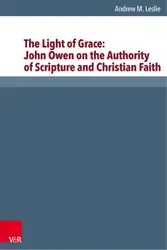Calvin hatte großes Interesse daran, was die Bibel über den Menschen lehrt, wer er ist, was er tut, was seine Rolle und Verantwortung in der Welt ist. Vom Gottesverständnis, so Johannes Calvin, lasse sich auf ein adäquates Verständnis des Menschen schließen, denn dieser sei in Gottes Ebenbild geschaffen. Geht man Calvins Verständnis von Gott näher auf den Grund, darf eine Berücksichtigung des historischen Kontextes, in dessen Rahmen sein imago Dei entstanden ist, nicht fehlen. Jason Van Vliet bettet seine Überlegungen in die stark humanistisch geprägte Denkweise der Renaissance, seine Interaktion mit Philipp Melanchthon und seine Auseinandersetzung mit Andreas Osiander ein und kommt schließlich zu einer genauen Profilierung des imago Dei des Johannes Calvin.

Calvinus sacrarum literarum interpres : Papers of the International Congress on Calvin Research
book
Divine Accommodation in John Calvin's Theology : Analysis and Assessment
Arnold Huijgen
book
Calvinus clarissimus theologus : Papers of the Tenth International Congress on Calvin Research
book
Rights in the Law : The Importance of God's Free Choices in the Thought of Francis Turretin
James E. Bruce
book
Britain and the Bestandstwisten : The Causes, Course and Consequences of British Involvement in the Dutch Religious and Political Disputes of the Early Seventeenth Century
Eric Platt
book
The Light of Grace: John Owen on the Authority of Scripture and Christian Faith
Andrew M. Leslie
book
Calvinus Pastor Ecclesiae : Papers of the Eleventh International Congress on Calvin Research
book
Reformation of the Commonwealth : Thomas Becon and the Politics of Evangelical Change in Tudor England
Brian L. Hanson
book
Petrus van Mastricht (1630-1706): Text, Context, and Interpretation
book
Reprobation: from Augustine to the Synod of Dort : The Historical Development of the Reformed Doctrine of Reprobation
Peter Sammons
book
Catholic Today : A Reformed Conversation about Catholicity
Willem van Vlastuin
book
The Ground, Method, and Goal of Amandus Polanus' (1561–1610) Doctrine of God : A Historical and Contextual Analysis
Stephen B. Tipton
book

